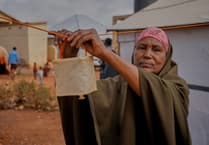I will always be thankful for the two history teachers who taught me to think, to challenge and to respect other peoples’ opinions. It was a valuable lesson although it did get me into hot water during my first year at university. When I questioned something one of my lecturers said in a seminar he replied, “Are you daring to question me the greatest living modern historian?” There was no answer to that, at least not at the time. I was 18 and he had all the power. It’s familiar a story.
His rather pompous response sprang to mind the other day when I read an article that said recent research conducted by Ipsos Mori has found that a lot of Brits are afraid to express their true opinion. The survey of some 2,300 people which was conducted on behalf of the government's Commission for Countering Extremism found that some 49 per cent of people feel others are far too easily offended, especially when subjects like race, religion and immigration are being discussed.
I don’t think it’s confined to those three contentious areas either. It’s not easy discussing Mr Trump or Gaza for example, and I have been characterised as a ‘bigot’ and as ‘hateful’ for some things I have said about sexuality and gender. Interestingly another recent article said there is a ‘tacit or overt refusal by orthodox leaders to engage’ with the claims of people like the former Archbishop of Canterbury who now challenge traditional teaching on issues such as same sex relationships. It would seem that it is easier to keep your head down.
Thankfully there are still people who are willing to stand up and ask questions even when they know their intervention might prove provocative. That is why I was pleased to read a report that raised questions about the birth of eight babies free of mitochondrial disease.
It is an amazing achievement and a testimony to those whose scientific skill has made it possible. I don’t want to undermine the sense of joy these parents must be feeling either because I would dread the thought of my children suffering from such a devastating genetic disease. That’s why I can understand the euphoria expressed by the anonymous mother who said that the emotional burden she had been enduring has been replaced by hope, joy, and deep gratitude.
But it is essential that when it comes to any scientific advance that we raise questions to make sure we are doing the right thing. There are serious ethical implications in this development because it seems to involve ‘the destruction of two living embryos to create a third’. A spokesperson for Right to Life UK summed it up well: two individual human beings have had their lives ended to create a third!
So, here’s a question for us all to ponder: at what stage of development does an embryo deserve to be seen as a human being? The answer to that question has all sorts of implications.



Comments
This article has no comments yet. Be the first to leave a comment.